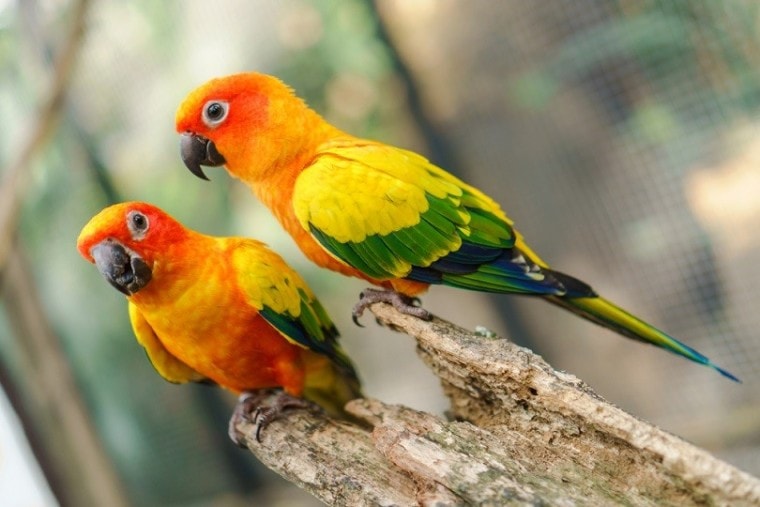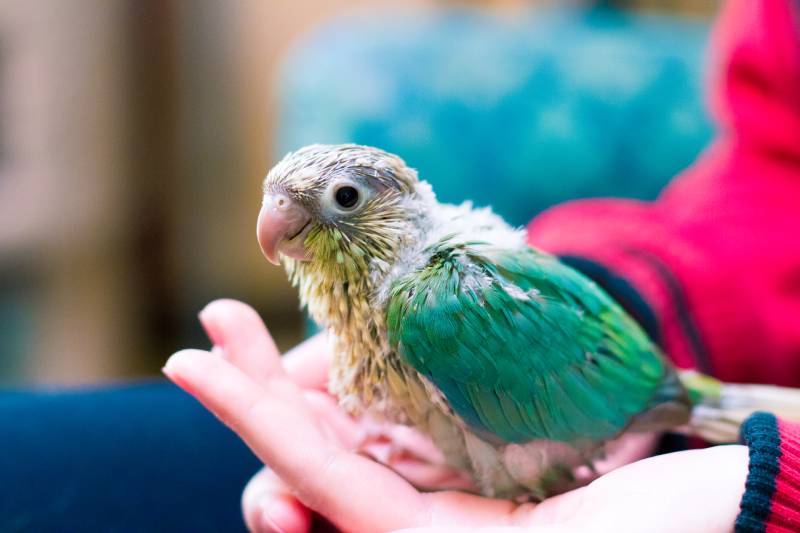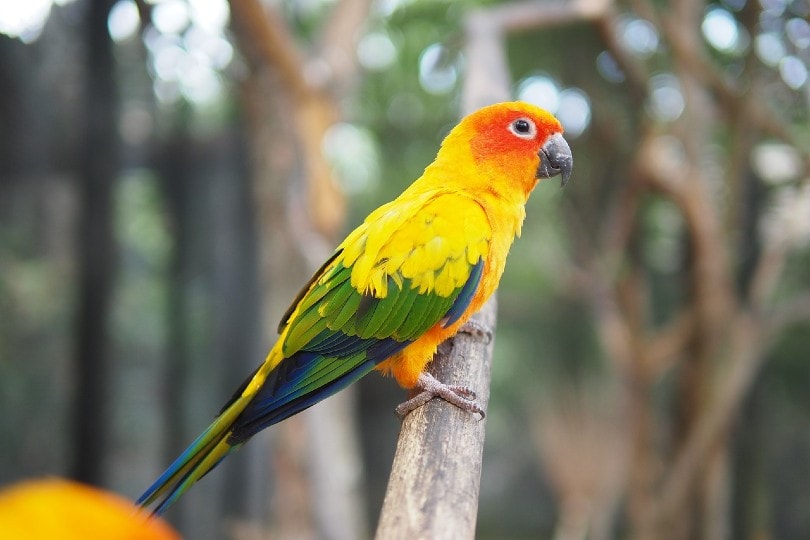
If you are trying to train your conure, you might want to know just how you can accomplish this. Conures are one of the most popular parrot choices you can find on the market. People adore them for their curious personalities and spicy attitudes.
Owning a conure can be a challenge itself, and training is no exception. These parrots tend only to do what they want when they want. Convincing them that they would benefit from training can really be a doozy. But with enough patience and perseverance, it can be done.
The 6 Tips to Training Your Conure
Before you start training, you need to make sure the area is set, and the mood is right. Here are some things to keep in mind before each session:
1. Patience
Because conures are so challenging to work with, you need to have all the patience in the world when you start to train them. You have to keep in mind before you begin that the likelihood of them resisting you is pretty high.
After all, conures can be moody birds and therefore might not feel up to it whenever you’re ready. If your conure is exceptionally erratic, you might want to take a rain check for training that day. Also, try to explore other incentives.
2. Clear Distractions
If you spent any time at all around your conure, you know just how short their attention spans are. When you begin the training session, you will want the room and training area to be completely distraction-free.
That means clearing out any colorful toys, closing off any windows, and making sure it is just you and your bird. Once you have their full attention, you can get down to business.

3. Utilize Positive Reinforcements
Because they are so headstrong, using negative reinforcement tactics when training is not going to reap any desired rewards. Always use positive reinforcement tactics like verbal praise and treats. Your parrot more responds much better to these things than punishments or strong, aggressive tones.
4. Make It Fun
Your conure will perform better if they don’t feel like it’s all work and no play. Make sure to use lots of voice inflection, stay upbeat, or make it seem like a game. The more you keep the energy up and the mood set, the better your bird should respond.

5. Repetition
As with anything else, your conure won’t understand the concept of the trick the first time around. It will take many repetitions before they’re able to perform. And keep in mind that no bird is the same, and time will be different for each one.
If you have multiple conures, some may catch on quicker than others to certain concepts. This is expected behavior, so you always have to train each bird based on its own intelligence and receptiveness.
6. Timed Sessions
Every bird has their limit, and you can keep its attention for different time frames. It’s best to keep training sessions short and sweet so that you don’t overextend them or stress them out.
A good rule of thumb is to keep training sessions set at approximately 5 minutes apiece, with a 2-minute variation. That way, you can keep them on task but not make things too complicated.

 Benefits of Training
Benefits of Training
When you train your bird, that requires spending one on one time with them. As you probably can imagine, that has its perks. Let’s go over a few areas that improve when you work with your conure.
 The 5 Cool Tricks to Try Out When Training Your Conure
The 5 Cool Tricks to Try Out When Training Your Conure
1. How to Teach Your Bird to Wave
In this video, this sweet girl explains how to get your bird to wave. Her instructions are straightforward—and she has adorable helpers to demonstrate.
2. How to Train Your Bird to Do Awesome Tricks
In this video, this bird owner shows a list of supplies you’ll need before you get started. She goes over how to do flips, toilet training, kisses, and more!
3. Coin in Bank Training
In this video, you’ll learn how to create a more frugal bird by teaching them to stash their coins. This trick involves a lot of mental stimulation, so you will definitely keep them busy.
4. How to Teach Your Bird How to Spin
This short and sweet video goes over how to teach your conure to do a basic spin. If you want them to dance for treats, this might be the trick you need to master.
5. How to Teach Your Bird to Fetch
The same instructor as the previous video teaches you how to train your bird to play fetch. She goes over the materials you need and carefully shows three steps for successful retrieval.
Popular Types of Conures
| Sun Conure | Orange and red |
| Green-Cheeked Conure | Green, gray, and red |
| Blue Crown Conure | Green with blue head |
| Jenday Conure | Orange, red, green |
| Nanday Conure | Blue, green, black |
Factors That Play Into Training

Certain aspects make it harder or easier to train your conure. Let’s explore some of the different factors.
Age
The younger your conure is, the easier it will be to train. That is true with just about any animal on the planet. If you plan to teach your conure tricks, the sooner you can start, the better.
Don’t be discouraged if your conure is older. You can try to train them to learn tricks at any time. It’s simply more effective if you have a fresh, young mind willing to take in new information.
Personality
Conures are spirited little birds that have minds of their own. Some of them will be much calmer and easier to train than others. If you have a bird that’s a bit of a spitfire, you might have to do some major convincing to get them to cooperate.
If you have a challenging conure, it might take much longer to train one task. But you do have to be prepared in advance because it’s hard to tell exactly how long it will take for each individual.

Relationship
Before you start any training, you will want to form a bond with your bird. When you first bring home your conure, chances are they’re going to be pretty shy for a while. It takes them time to warm up to their environment and all these new sights and sounds.
The more your bird trusts you and the closer you become, the more likely it will be receptive to training.
Conclusion
Training your conure doesn’t have to be a daunting task. The better your bond, the smoother the training experience will be. So, always have a relationship and level of trust built with your bird before starting the process.
Next, pick out a few tricks that you think are simple enough to start. Work with your bird every day, and make sure to repeat any task, and offer lots of praise for a job well done. You’ll have a regular performer in no time.
- See also: Blue-crowned Conure
Featured Image Credit: Naypong Studio, Shutterstock


 Benefits of Training
Benefits of Training The 5 Cool Tricks to Try Out When Training Your Conure
The 5 Cool Tricks to Try Out When Training Your Conure





